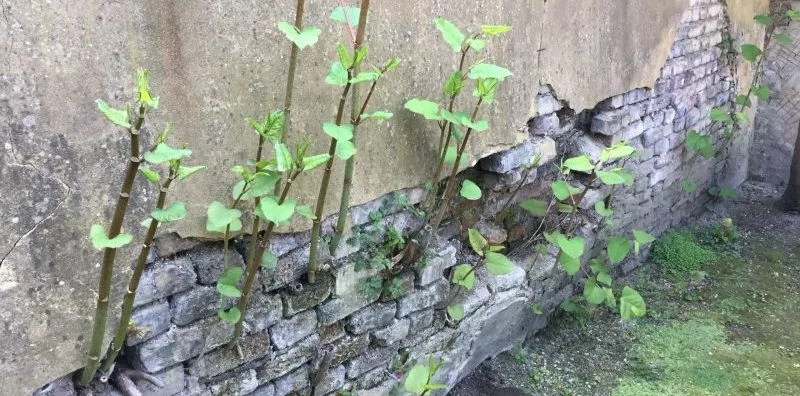
In 2021, Mr Walker (name changed for privacy) purchased a property in London valued at over £650,000. The previous owner (the defendant)







Japanese knotweed is a fast-growing and strong perennial with tall, dense stems. Although the plant dies back to ground level in winter, by early summer, the bamboo-like stems shoot up to over 7ft.
If you suspect knotweed to be growing either on your property or on any neighbouring land, it’s important that you take action as soon as possible.
If untreated then knotweed can quickly take over your garden. Its root systems are incredibly resilient and have no trouble in burrowing through driveways, cracking drains and even bringing down garden sheds.
These roots cannot simply be pulled out, they require professional attention in order to be removed completely. It’s actually illegal to try and remove the plant yourself unless you are an expert.
It is important that if you have Japanese knotweed you seek the guidance of a knotweed treatment firm. If we take on your claim, we can help recommend a firm that can provide an effective treatment supported with an Insurance Backed Guarantee.
Japanese knotweed is a serious problem that can be expensive to effectively eradicate.
It could lead to a fall in the value of your home, and when your house is your great asset, it’s important you take measures to protect it.
We will help you recover any treatment costs as well as receive compensation in order to reflect the fall in the value of your home. This can be as much as 10% of the value of your home.
It’s illegal to try and remove the plant yourself and by failing to take the appropriate steps to deal with the infestation you may find that you make the situation worse. You could end up allowing the infestation to spread onto neighbouring land and find a claim brought against you. Read more about the legal situation with Japanese Knotweed when both buying and selling your property.

Bringing a Japanese knotweed claim depends on your individual situation. We have set criteria in order to be able to claim. These can include:
Still not sure if you’re eligible to claim? We can offer you free advice, on whether we take on your claim or not, so if you’re unsure, then just get in touch.
If you are selling, it is your responsibility to check the garden for Japanese knotweed. If the plant is present on your property, then this needs to be declared to potential buyers as its presence could affect your house value and selling capability.
If the presence of the plant is not disclosed, you could be liable for a misrepresentation or breach of contract claim after the sale.
The presence of Japanese knotweed should be stated in relevant forms before you commit to buy. This usually results in your mortgage lender requiring assurances from the seller that the plant will be eradicated, before they agree to lend the necessary funds.
If you believe the plant was present prior to buying and it was not disclosed, then you could be eligible to make a claim.
In addition, prior to purchase either you or your mortgage providers will have instructed a surveyor to carry out a detailed survey of the land. It is the surveyor’s responsibility to look for Japanese Knotweed and if found to mention in their report. If you believe that the knotweed was present prior to the survey and was missed by the surveyor then you can bring a claim for compensation as a result of their professional negligence.
As soon as you identify Japanese knotweed on your property, you should take measures to manage, and if possible, eradicate the weed.
If you allow the plant to spread to other properties, you could be liable for a claim to be made against you.
If you believe that knotweed has spread on to your land from neighbouring land then you may be able to bring a claim.
Neighbour disputes over Japanese knotweed are much more difficult to negotiate as it can be hard to determine where the plant originated from. If your property has been taken over by the plant through land like railway ground, a shopping centre, a canal or similar, then it is much easier to claim.
Discovering the source of a Japanese knotweed infestation is key to determining what party is at fault.
If it can be proven that the knotweed has entered from a neighbouring property then you should be able to claim for the costs of the removal of the plant and possibly compensation for the fall in value of your homes as a result of the infestation.

In 2021, Mr Walker (name changed for privacy) purchased a property in London valued at over £650,000. The previous owner (the defendant)

When 50-year-old Patricia McCaulsky moved into her new home in New Addington in May 2019 she was overjoyed, even believing one plant

Grandmother Mary, from Preston, received more than £27,000 after Japanese knotweed from a nearby derelict railway line encroached on her property. The

Tony Hill, Head of Commercial Litigation and Dispute Resolution at The Brief Claims spoke with MSN about the alarming growth rate of Japanese

A version of this article was published by Birmingham Live. Just the thought of Japanese knotweed is enough to send shivers down the

The recent heatwave, which saw recorded temperatures rise above 40 degrees, could be contributing to the spread of Japanese knotweed in the